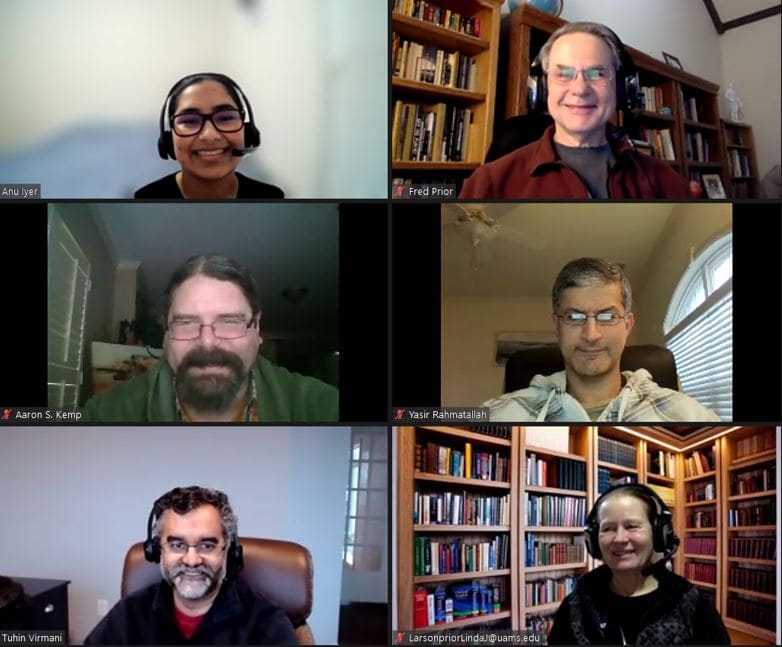
The UAMS Translational Research Institute today announced Tuhin Virmani, M.D., Ph.D., as the recipient of its first $75,000 Team Science Champion Award, allowing his further investigation of the potential benefit for remote assessment of people with Parkinson’s disease.
Remote assessment — or digital health — is a broad term used to describe the services clinicians can offer long-distance patients through email, text message and video chat. Through these mediums, clinicians can make contact, prescribe care, offer advice and monitor progress.
Virmani is an associate professor in the College of Medicine Department of Neurology, director of the Movement Disorders program, and director of the Huntington’s Disease Society of America Center of Excellence at the University of Arkansas for Medical Sciences (UAMS). He began the remote assessment research in 2021 with a pilot grant from the Translational Research Institute.
Virmani, who was selected from five applicants, aims to discern the quality of care that remote assessments offer to Parkinson’s patients in rural communities. By incorporating UAMS Regional Programs and the UAMS Rural Research Network, this study aims to determine which patients may benefit from utilizing care facilities closer to home to obtain specialist health care.
The grant will also fund the team’s efforts to strengthen its biomedical informatics tools that analyze voice and handwriting samples collected remotely.
A key criterion of the Team Science Champion Award is for candidates to exemplify cross-disciplinary collaboration. Virmani’s research team includes neurologists, biomedical informatics researchers, a psychiatrist and a high school student. Anu Iyer, a student at Little Rock Central High School, joined the team in 2021. She is applying machine learning methods to analyze voice samples of Parkinson’s patients with the hope of someday detecting the disease by voice.
“Dr. Virmani’s team has all the qualities we are looking for, and it is a project that can address one of the many complex health challenges of Arkansas’ rural and underrepresented populations,” said Laura James, M.D., director of the Translational Research Institute and UAMS associate vice chancellor for Clinical and Translational Research. “We look forward to seeing the outcomes from this promising interdisciplinary team.”
Parkinson’s disease is a neurodegenerative disorder that leads to progressive decline in motor function (balance, dexterity, tremors) and non-motor function (mood disorders, cognitive impairment, sleep disruption). These symptoms make travel difficult, especially for those in medically underserved areas. Of the four movement disorders neurologists in the state, three practice at the Movement Disorders Clinic at UAMS. Nearly 75% of that clinic’s patient population reside in rural communities.
Delivering quality medical care remotely has the potential to improve patient outcomes in medically underserved areas. It is unclear, however, if it is possible to deliver high quality care to Parkinson’s patients using digital health. The population is comprised of mostly elderly patients who may not have the needed technology at home or may lack the ability to use it. This is the question Virmani and his team hope to answer with TRI’s Team Science Champion Award funding.
The Translational Research Institute is supported by the National Center for Advancing Translational Sciences at the National Institutes of Health, under Clinical and Translational Science Award UL1 TR003107.
Story by Seth Hooker
